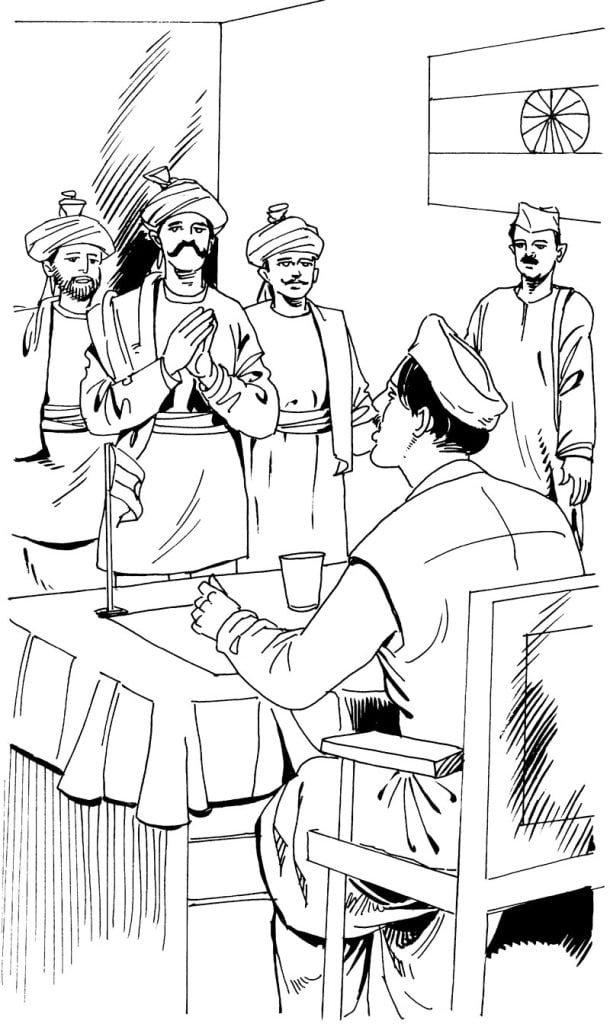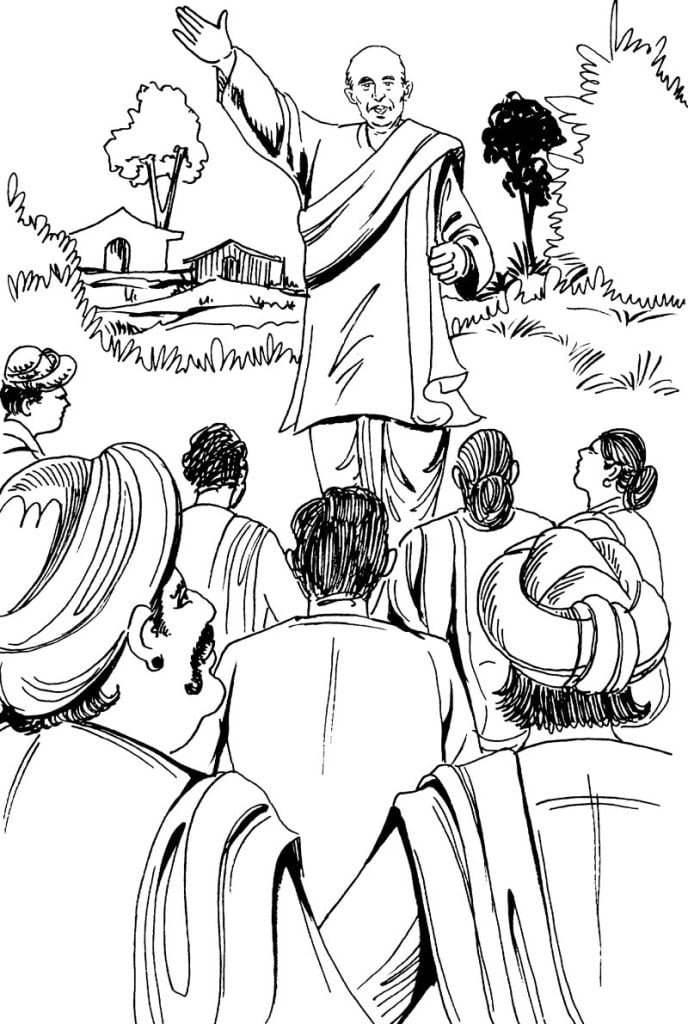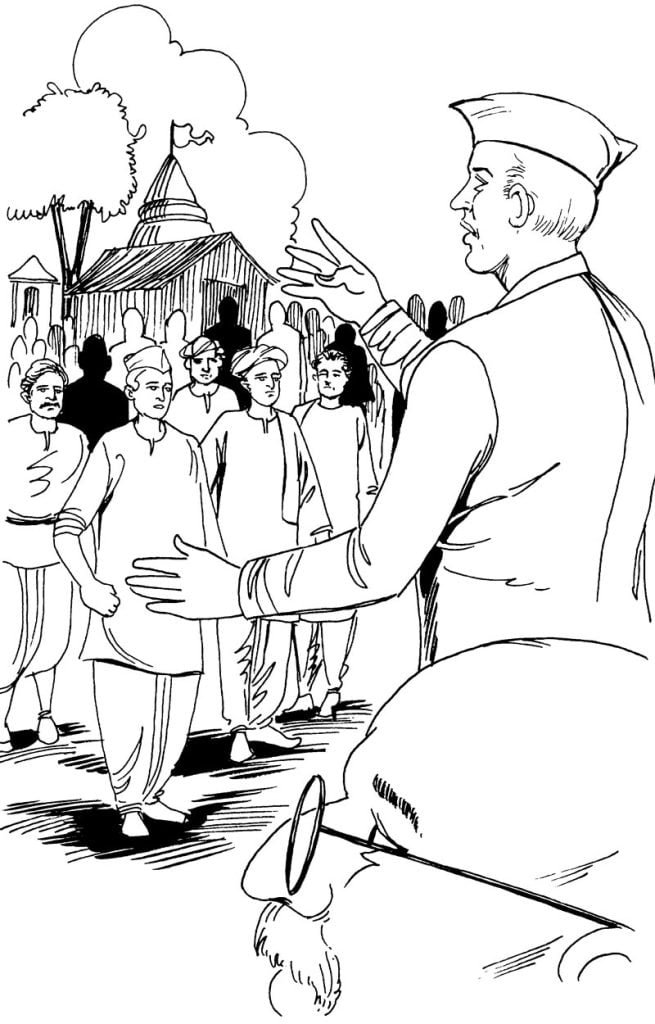Bardoli was the spring board from which Vallabhbhai was able to enter the national scene. The Bardoli Satyagraha of 1928 made Vallabhbhai a national leader not because of any particular features in the Satyagraha, but because of the existing framework of the Colonial State and because of the timing of the Satyagraha.
Kalyanji and Kunverji Mehta, the two Brothers who in 1921 had invited Gandhiji to organise a civil disobedience movement in Bardoli and who had been working towards maintaining a functioning organisation in the taluka, went to Vallabhbhai, along with the taluka secretary Kushabhai, and asked him to lead the peasants in a no-tax campaign.
Vallabhbhai was not inclined to interfere while council members were involved in heaping the Bardoli agriculturists. He did not want any duplication in leadership and wanted the people to come with a second request. When the peasant leaders repeated their request, Vallabhbhai set to work straight away and called a conference of agriculturists on 4th Feb. 1928, the day before the collection of the assessments was due. In Bardoli he addressed a conference which was attended by peasants of nearly 80 villages. He told them that as to the justice of their case he had not the slightest doubt, but he was not sure of their strength. He added, “I shall stand by the side of anyone who is prepared to take risks”.

On 6th February Vallabhbhai addressed a letter to the governor of Bombay requesting him to order a fresh inquiry as the increase was unjust and arbitrary, and to postpone the recovery of the revised land revenue. He suggested that government appoint an impartial tribunal, failing which he would advise the people to refuse to pay the assessment and suffer the consequences. In the first place, he pointed out, rent had been adopted as the basis of assessment and this was erroneous. In the second place, the groupings of many villages had been altered so that these villages now came into a high assessment category; this was arbitrary. Moreover all this had been done without giving the agriculturists any notice.
On 12th February 1928, Vallabhbhai met the agriculturists of Bardoli. He had not had a satisfactory reply to his letter to the government and now openly advised the farmers to refuse payment of the entire assessment so long as the government do not come to terms. Now the battle had begun. The following resolution was passed on 12th February 1928—
“This conference of people of Bardoli taluka resolves that the revision settlement in Bardoli…is arbitrary, unjust and oppressive, and advises all the occupants to refuse payment of the revised assessment in full until the government is prepared to accept the amount of the old assessment in full satisfaction of their dues, or until the government appoints an impartial tribunal to settle the whole question of revision by investigation and inquiry on the spot”.
Vallabhbhai devoted all his time and energy to organising, uniting and rousing the people. He went from village to village. He ate with them, mingled with them and talked to them. He delivered numerous speeches every day. He organised a publicity department which would issue, and distribute free, his speeches in pamphlets and also a daily news bulletin. He said, “The battle has began. We have established military camps—ashrams—everywhere. News from the villages must reach the headquarters daily and all orders issued by the headquarters must be complied with expeditiously. Our training and organisation must provide the key to our victory. Government has only one man in every village—a talati or a mukhi. Remember, we have at our disposal every single villager”.
Vallabhbhai particularly impressed two things on the people’s minds—(1) that the government would attempt to divide their ranks, a move which they must resist to the best of their ability and
(2) that the government would first strike at the leaders and confiscate the best lands so that if the most influential men succumbed the rest would yield sooner or later. The people were advised to be worry of such a move.
The government fired their first shot on 15th February by serving notices on 50 Banias to pay the revised land revenue within 10 days. Banias were considered to be weak and mild people and the government were hopeful that they would yield. But out of the 50 only two paid. When the people learnt of it they were annoyed with the two ‘black sheep’ and wanted to boycott them. But Vallabhbhai told them to remain calm.
Vallabhbhai moved from village to village and thousands listened to his speeches with devotion. He invited the women of Bardoli also to join the struggle “for the brunt will have to be born by them. They will have to see their dear cattle seized before their very eyes, they will have to put up with the repeated attachment parties, and unless they are accustomed to take these things as a matter of course, they might easily betray you. I therefore want as many women to attend as men”.
The government of Bombay was quite baffled by the Bardoli land revenue agitation. It blamed the collector of Surat who in turn blamed the lower officials—
“It is very evident that on the first warning given to the collector that there is likely to be any possible trouble about the payment of the revised assessment the collector should take immediate action…”.

The government expected the Satyagraha to fizzle out by the end of May 1928 when lands would be put up for sale and the threat of new buyers would bring the present owners to their success. Government was refusing an inquiry because they feared that Vallabhbhai would fallow up his success in Bardoli with agitations for other settlements. The 12th of June was observed as ‘Bardoli Day’. In Bombay all the markets were closed; Marwari bazar, Moti Bazar, cloth markets, grain markets, jewelry shops, Marwadi chamber of commerce, cotton markets, commission agency firms and all other commercial concerns had closed their business. In other provinces too, Bardoli day was observed by speeches being given to congratulate Vallabhbhai on his courageous stand and by the collection of funds. Soon the repercussions of the agitation had widened and Bardoli was receiving support from outside.
When the government realized that the imposition of fines had no effect on the people it started confiscation of land. But still the people remained unperturbed. To crush them the government resorted to a new expedient of attacking the cattle of the peasantry. Vallabhbhai exhorted the people to remain firm. At one place he said, “Let them capture your souls. The infatuation for possession is not good. How much land does a man require? The Muslim not more than two cubits and a half and the Hindu that much only for a couple of hours. God is always with the just”.
Vallabhbhai then appealed to Patels and Talatis to resign. At his call 69 out of the 90 Patels and 11 out of 35 talatis resigned. It was at this time what Vallabhbhai came to be known as the ‘Sardar’ of the peasants. This appellation stuck to his name for all his life.
When the government’s repressive measures proved to be ineffective then sanity dawned on them. They were frightened that if the Bardoli Satyagraha spread to other parts of India that would be the end of British rule. So they decided to compromise. Vallabhbhai was approached. He dictated his terms which were—
(1) Pending the inquiry old assessment would be accepted.
(2) Satyagraha would be called off once a judicial inquiry in announced.
(3) All confiscated lands would be restored.
(4) All satyagrahi prisoners would be released.
(5) All talatis and Patels would be reinstated.
The government acceded to all the demands of Sardar Patel. The independent inquiry after a thorough investigation recommended an increase of 5.7% as against 22% originally fixed. Thus ended this glorious struggle. The Bardoli struggle was significant from many points of view. It demonstrated to all the world that truth and non-violence cannot be crushed. It compelled the mighty government, pledged to crush, to yield within a fortnight of the pledge. It was a victory for both the satygrahis and the government and that is why both Gandhiji and Vallabhbhai congratulated the people. Secondly, the Bardoli Satyagraha was a landmark in the history of our freedom movement. It gave a new meaning and significance to the history of satyagraha in India and paved the way for the future bigger struggle. Thirdly, it projected the personality of Sardar Patel and proved his organising capacity and ability to lead people.
The conduct of the campaign gave Vallabhbhai considerable prestige amongst the agriculturists. Gandhiji gave whole credit to Vallabhbhai for the success of the movement. He said—“Finally we won only due to the severe efforts of Vallabhbhai”. On this occasion Gandhiji gave an honour letter to Vallabhbhai. Lala Lajpat Rai and Subhash Chandra Bose were also greatly influenced by the works of Vallabhbhai. The whole country acclaimed his works. Many Congress leaders told Vallabhbhai the richest in having unique personality. Vallabhbhai thanked everybody for their kind gesture and said—“The credit you all have given to me for the success of Bardoli movement is not mine but should be given to the unity of the peasants. If our peasants would not have shown courage in unity, we could not have won. I with the core of my heart thank to all my peasant brothers for their kind cooperation”.

Mahadev Desai wrote in an newspaper named ‘Young India’ about Vallabhbhai—
“The success of Bardoli movement is the third success of Vallabhbhai. This victory had caught the attention of not only India but among many empires. Looking his fight for justice for people, the whole country’s wishes are by his side. The success of Bardoli encouraged many frustrated leaders. Today India needs such type of strong courageous persons”.
